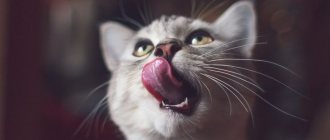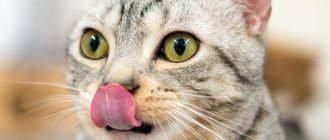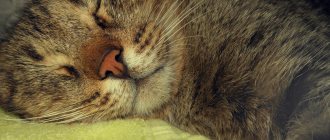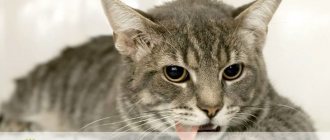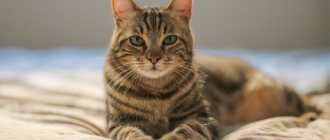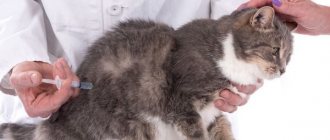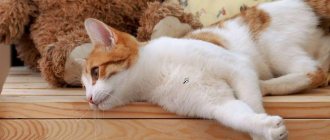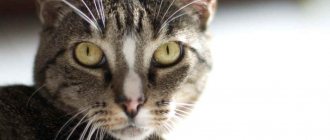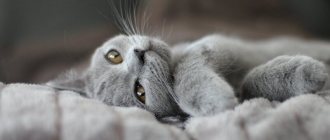Natural "refrigerator"
A cat's tongue is simply indispensable in hot weather.
By licking the surface of the fur coat, the purr reduces the air gap between the skin and the surface of the fur, thereby promoting better cooling of the body. When it becomes completely unbearable, the animal sticks out its tongue and begins to breathe quickly. Moisture evaporating from the surface of the tongue helps further reduce body temperature. Many of us have cats or cats living at home. Some are purebred, some are not. However, for all representatives of the cat family, we take this fact for granted, without even thinking about the nature of this phenomenon. Why do cats have rough tongues? Why do they need such a language and what functions does it perform? Let's answer these questions.
Why doesn’t the animal remove its tongue and even bite it?
The reasons why representatives of the cat family constantly stick out their tongues, as a result of which they sometimes bite it:
Persian cat
- Special structure of the muzzle. There are cat breeds with a flattened muzzle. This structure is called brachycephalic, and animals are called brachycephalic. Animals that have a very short nose are considered flat-faced. They have a widened and flattened skull at the front. Due to genetic characteristics, the bite of some brachycephalics (Persians, Scots, British) is incorrect. The flat structure of the muzzle leads to the fact that the tongue does not fit behind the teeth, protruding slightly forward. An animal that always shows its tongue is not recommended for breeding.
- Mental retardation or complication of TBI. Such animals almost always have a limp tongue. Cats that have suffered a traumatic brain injury may also experience a similar phenomenon.
Diseases
Veterinarians identify the main reasons why a cat sticks out its tongue:
- allergies that cause swelling of the throat;
- inflammation of the gums, mouth;
- dental diseases;
- amyotrophy;
- improper functioning of the salivary gland;
- skull injuries.
You can often see a cat with its tongue hanging out after anesthesia. During this period, the animal cannot yet control its jaw independently. The oral cavity closes completely only 24 hours after surgery.
Infections
A protruding tongue can be observed in cats in the case of infectious diseases such as rhinotracheitis, chlamydia and calcivirosis. In this case, animals may exhibit the same symptoms as in the case of respiratory disease. In addition, pets may have bowel movements and purulent discharge from the nose and eyes. The infection can also cause swelling in the mouth, causing the tongue to fall out of the mouth.
Important! If the cat begins to show aggression, it has profuse salivation, an open mouth and bulging eyes, this may indicate the presence of rabies.
In the case of an infectious disease, the animal also behaves strangely
Tumors
Oncology of the oral cavity is one of the most dangerous causes of a protruding tongue. If there is plaque, bleeding, bad breath, a hoarse voice, problems chewing or swallowing, or painful mouth ulcers, your pet needs immediate medical attention.
Note! A cat can stick out its tongue not only due to a malignant tumor, but also in the case of polyps located in the oral cavity
Swelling of the larynx due to allergies
Sometimes a similar reaction of an animal can be observed in case of allergies. The most common allergens are medications or food consumed. As a result, swelling of the larynx may occur. Symptoms include enlarged palate and tonsils, respiratory problems (infrequent, deep and slow breaths may be accompanied by coughing), slow heartbeat, problems swallowing, hoarse voice and restlessness.
Respiratory diseases
Sometimes cats stick out their tongues and breathe like dogs due to diseases such as rhinitis, ARVI, tracheitis, pneumonia and bronchitis. The main signs of the disease are difficulty breathing, coughing, wheezing when inhaling and exhaling, wheezing, lack of appetite, and nasal discharge. Temperature may also rise and apathy may appear.
Jaw injury
If there is no appetite, excessive salivation and prolapse of the tongue, the cat should be checked for a dislocated jaw. In case of bilateral dislocation, the pet is deprived of the ability to close its mouth. If a unilateral dislocation occurs, then the animal’s mouth, as a rule, is slightly open, with the jaw noticeably protruding to the side.
Heart failure
Such a serious illness as heart failure is often accompanied by pulmonary edema. This causes the cat to try to breathe from its belly rather than from its chest, with its tongue usually sticking out. Signs of this disease are a weak appetite or its complete absence, the tongue and gums acquire a blue tint, a distinct hoarseness appears when breathing, the heartbeat quickens, coordination of movements is impaired, the work of the hind legs is not always synchronous, some of the receptors may be paralyzed. Cats may also stick out their tongue due to conditions such as ischemia, angina, and hypertension.
Kidney failure
Sometimes you can observe that a cat sticks out its tongue and at the same time breathes very heavily. This usually happens when there is a problem with the kidneys. Signs of kidney failure are the following symptoms: unpleasant odor from the mouth (with an ammonia taste), vomiting and diarrhea, mucous membranes acquire a yellow tint, deterioration in the condition of the coat and skin, weight loss. The cat may also experience extreme thirst, frequent urination, blurred vision, and severe swelling in the abdomen.
Poisoning
Poor nutrition and poor quality food can lead to poisoning of your pet. The owner may notice characteristic symptoms:
- cough;
- urge to vomit;
- vomit;
- bloating;
- diarrhea;
- increased intestinal motility;
- gurgling in the stomach.
Due to frequent vomiting, the cat sticks out its tongue. Since pathological signs are present, it is impossible to confuse cat diseases with a physiological norm.
When a cat's tongue sticks out is normal
Veterinarians will name many pathologies in which a cat sticks out its tongue. However, we are not necessarily talking about illness. Do not panic ahead of time if you notice strange behavior in your pet. There are many situations in which a cat’s tongue sticking out is normal. Among the most common are the following:
- The animal is as relaxed as possible. As a rule, this happens during sleep. The tongue, like any muscular organ, should also rest. After all, it already has a lot of functions that tire it. During relaxation, the cat's tongue becomes slightly longer than when it is tense. So it sticks out of the mouth. This feature is unique to pets. Cats living in the wild cannot afford to relax for a second. They are tense even in their sleep, and they always keep their tongues shut.
- Cats stick out their tongues because of the heat. The pet's heat exchange has been disrupted. It is urgent to give him something to drink and move him to a cool place if the cat is in the sun. Without doing this, you can bring the animal to heatstroke.
- Malocclusion is another common reason for a cat sticking out its tongue. The abnormal structure of the jaw is to blame, in which it is shorter than necessary; the organ simply does not fit in the mouth. Malocclusion is common in artificially bred elite breeds. Sometimes this becomes a real shock for cat owners who dream of world fame for their pet. After all, with such a defect, an animal, even if it is of royal blood, will not be able to participate in exhibitions and other prestigious events.
- Another reason is simple forgetfulness. The cat sometimes just gets distracted. Periodically forgets to hide his tongue even after hygiene procedures. This happens, for example, when she was washing her face and the owner called out to her. The cat turned around, but didn’t have time to hide his tongue. As a result, the cute photo is ready.
As you know, cats are very smart and quick-witted animals. Many of them are well trained, and Kuklachev’s wards are an example of this
So, some cats, having stuck out their tongue involuntarily a couple of times and noticing that the owner was delighted, can then do this on purpose in order to attract the precious attention of the owner and other people. Of course, this is a fairly rare reason for a cat sticking its tongue out at you.
Only the most vain (or those experiencing acute attention deficit) or overly intelligent individuals do this.
shutterstock
Heat
The main physiological reason why a cat sticks out its tongue is temperature regulation. The animal protrudes the organ to reduce discomfort, for example, during heat. This prevents the development of heat stroke. In this case, the owner should take the cat to a cool place and pour water on it.
But a cat's tongue sticking out can also be a signal of high body temperature. To understand whether your pet is suffering from heat or is sick, you need to figure out what temperature is considered normal in cats.
The normal temperature for a cat is 38-39 degrees. But don’t panic right away if the indicator deviates slightly from the norm. Here are the common reasons for the thermometer to shift:
- immediately after sleep, the thermometer drops by a couple of divisions;
- in the evening the cat’s body temperature will be higher than in the morning;
- Kittens have a slightly higher temperature than adult animals.
If the temperature rises due to illness, you should not self-medicate - the animal should be taken to the veterinarian.
Features of the structure of the cat’s oral cavity and its tongue
The oral cavity of representatives of this family is formed:
The tongue, which is an elongated movable organ located at the bottom of the mouth, with its base attached to the body of the hyoid bone, and the free tip located in the anterior zone of the jaw. On its surface there are papillae - special mushroom-shaped structures with tiny holes or pores leading to taste buds. The tongue is predominantly formed by bundles of muscles, which are interspersed with hard connective and fatty tissue. It is penetrated by many blood vessels. It is surrounded by the openings of the ducts of the salivary glands, through which saliva enters the oral cavity. This organ is responsible for many functions: moving food in the mouth, helping with chewing and swallowing, delivering liquid to the oral cavity when drinking, determining the taste of food through taste buds, regulating body temperature (by moving over the tongue in the back and front directions, the air is cooled , evaporating saliva), cleaning the fur.
Teeth located along the outer boundaries of the oral cavity, the upper of which are fixed in the maxillary bone, and the lower ones in the mandibular bone. Each of these bone formations consists of pulp, dentin, enamel and cementum. The tooth root is held in the bony socket of the jaw by periodontal ligaments of connective tissue. One tooth may have one or more roots. Kittens have 26 milk units, adult animals have 30 permanent ones: 12 sharp incisors, 4 long canines, 10 premolars, 4 molars. Functions of teeth: grinding and chewing food. The incisors are responsible for biting off food, the canines are for piercing and tearing it, the premolars are for rubbing, grinding and chewing food, and the molars are for final chewing.
- The mouth, used for receiving food and its primary processing. It is the gateway to the gastrointestinal tract. A cat's mouth is located in the lower front part of the snout between the maxillary and mandibular bones. It is formed by the space behind the teeth and gums, lips and cheeks. The main part of the mouth is bounded above by the hard and soft palate, on the sides and in front by the teeth and lips, and below by the tongue and adjacent tissues. The mouth is responsible for the production and secretion of saliva, which moistens food and helps form portions of it. It contains enzymes that help digest food and cleanses the tongue. Through the mouth, additional oxygen is supplied to the cat's respiratory system if necessary.
- Membranous mucous membrane. The upper part of the oral cavity is the palate. Its anterior part, which is formed by mucous-covered bone, is the hard palate, separating the oral cavity and nasal passages. The soft posterior region is the soft palate formed by the flexible fold of mucous membrane between the back of the mouth and nasal cavity.
- The lips, with the help of which the animal picks up food, throwing it into the oral cavity.
- Cheeks.
- Numerous small glands, including the sublingual salivary gland, which is located under the tongue.
Physiological reasons
Sometimes a protruding tongue is explained by simple physiology. In these cases there is nothing to worry about.
Washing
You can often see a cat sitting with its tongue hanging out after a long wash. Perhaps this is how she relaxes her muscles or meditates.
Relaxation
When a cat sleeps, the muscles of the tongue are relaxed and it naturally lengthens. Therefore, the animal’s mouth is half open and the tip of this muscular organ protrudes from it.
Stressful situations
Many animals, when in an excited state, are characterized by rapid breathing. The protruding tongue facilitates the passage of oxygen to the respiratory tract.
Overheat
Both dogs and cats, when they are hot, breathe heavily with their tongues hanging out. And this is a physiological norm - this is how they cool down. After all, they have practically no sweat glands; a small amount of them is located only on the pads of their paws.
Sexual rut
A protruding tongue can be seen in a male when he is excitedly “courting” a female, and this is also considered a physiological norm.
Childbirth
During the birth of kittens, the cat breathes heavily, constantly licks itself, forgetting to remove its tongue. At this point in her life, this is an absolutely normal sign, as she is very tense, tired, and may have a fever.
Nausea
Some pets get motion sickness from riding in a car. A sign of impending nausea and vomiting can be the tip of the tongue sticking out of the mouth.
The same situation occurs with a pet after anesthesia, for example, after sterilization or castration. But here general muscle weakness joins nausea.
Sounds
A certain frequency of vibration of sound waves causes reflex yawning and the effect of protruding the tongue in cats. For example, if you run your finger over the teeth of a fine-toothed comb or tear off some tape.
Infectious diseases
Serious infectious diseases, such as rhinotracheitis, calcivirosis, are accompanied by fever, sneezing and runny nose, which causes protrusion. Calicievirosis is distinguished by ulcers on the animal's tongue and discharge from the nose. Ulcers in the mouth, salivation, and nasal discharge accompany the disease rhinotracheitis. Flat-faced cat breeds – Persians – are especially susceptible to it.
Stress
In stressful situations, cats often begin to actively lick themselves or simply stick out their tongues and breathe like a dog. This is natural behavior of the animal.
Functional brain disorders
Cats are prone to nervous disorders. Alarming symptoms include: convulsions, strabismus, protruding, urinary and fecal incontinence. A fallen tip is also one of the signs of a pet's imminent death.
Malocclusion
Not all cats have a correct bite from birth. Some breeds have structural features of the lower jaw, for example, it can protrude forward. This leads to the fact that the teeth do not cover the tongue, and it can easily penetrate outward.
Note! Treatment of a problem bite will be needed if the pet experiences serious discomfort due to an incorrect tongue arcade.
Inflammation in the mouth
Inflammatory processes in the mouth, its mucous membrane, can push the purr to stick out its tongue to relieve pain. Such symptoms occur with stomatitis.
Abyssinian cats are susceptible to gingivitis.
The main cause of gingivitis is poor diet and lack of oral hygiene.
To avoid oral problems, cats need to have their teeth brushed every one to two weeks. The kitten must be accustomed to this procedure after three to four months.
Gastrointestinal dysfunctions
Animals, like people, can feel sick. At the same time, cats sometimes stick out the tip of their tongue. Especially if the nausea is severe and there is vomiting. The cat, preparing to empty its stomach, already opens its mouth and sticks out its tongue. In addition, he may be bothered by increased salivation.
Such situations can arise for various reasons. From elementary and easily removable - the animal got sick in transport, to serious poisoning and pathologies of the liver or gastrointestinal tract.
IMPORTANT: if the kitten always walks with his tongue sticking out
..., but no symptoms are detected, take the baby to the veterinarian
Perhaps your cat has an incorrect bite, and then it is very important to monitor the cat’s drinking, because you cannot allow the tissues of the tip of the tongue to dry out
An adult cat can sometimes “freeze” when washing itself. Distracted by something more interesting than hygiene, an adult cat may forget to remove his tongue
This usually doesn’t last long, the cat will either continue to wash itself or go look at the reason that distracted its attention.
Also, an adult cat in the heat or after active games and activities can fall asleep like a kitten with the tip of its tongue slightly sticking out. This is how the animal cools the blood through external cooling of the tongue and saturates it with oxygen spent on activity. Therefore, if a cat sleeps with its tongue hanging out and does not drool or foam, there is no need to worry.
Stress
The cause may be stress in cats. We will look at the symptoms and treatment below.
If the pet is stressed, the tongue will stick out. For example, when driving a car, if the cat is afraid, then the tongue will hang out the whole way. Fear, nervous shock, negative emotions are the reasons that cause stress in cats. When an animal is nervous, the following symptoms appear:
- tongue sticking out;
- the cat is shaking;
- the pet is trying to hide;
- meows constantly.
If the cat is scared, the symptoms may recur. Therefore, the animal requires treatment. He needs to be provided with complete rest. If necessary, the veterinarian will prescribe sedatives.
Physiological characteristics or illness?
Cats often stick out their tongues or open their mouths when they smell something interesting. You may notice that even your pet's whiskers stretch towards the scent of interest. This behavior is explained by the fact that in addition to the receptors in the nose, the cat detects odors with its tongue and air waves with its mustache. No, this is not a mistake, the tongue also has receptors responsible for the assimilation of smell, and they are there, and yours are simply not as developed as those of a cat.
Many young cats stick out their tongues when hunting or imitating it. In this case, there are two reasons: instinct and passion. The cat sticks out its tongue to enhance the smell and it does this unconsciously, but instinctively. A young pet, engrossed in play, may stick out its tongue and not even notice it. Moreover, the cat can walk like this for a long time after playing and not experience discomfort.
Veterinarians identify the reasons why a cat sticks out its tongue:
- Relaxation. During rest and sleep, the jaw muscles are maximally relaxed, which leads to prolapse of the muscular organ.
- Thermoregulation. If a cat is hot, it sticks out its tongue, thereby trying to normalize the temperature.
- Absent-mindedness. A cat may simply forget to retract its tongue after licking fur or active games.
- Bite. Due to malocclusion, the tongue simply does not fit in the cat’s mouth. That's why it sticks out. Such pets do not qualify for participation in competitions and exhibitions based on their appearance.
- Childbirth. Before the expected birth, the cat's behavior changes. She becomes excited, her breathing quickens, her mouth is slightly open, her tongue sticks out.
- Praise. The cat sticks out its tongue in response to praise. If the owner is constantly touched by the sight of a cat with a hanging tongue, then the animal will systematically carry out such an action for the sake of approval.
- Hunting. When hunting, cats involuntarily stick out the tip of their tongue. This is due to the fact that in this position of the muscular organ the animal’s sense of smell increases.
- Age. A cat who has crossed the age of 8 may have loose teeth and fall out. From the cracks that appear, the tongue freely looks out of the oral cavity.
Functional brain disorders
Veterinarians identify the causes that lead to disruption of the brain and nervous system:
- traumatic brain injury;
- past infectious diseases;
- stroke.
The above reasons lead to a lack of coordination: the cat cannot independently control movements or control muscles. So he sticks out his tongue.
Veterinarians offer a small test that helps make sure that your cat has no neurological problems. If the animal sticks out its tongue, you need to touch it a little. If there are no neurological problems, the cat will quickly hide its tongue. If the actions do not bring results, we can talk about a pathological signal from the body.
Why do cats stick out their tongues?
In addition to hygiene, a cat's tongue is designed to draw in water (literally) and swallow food. You've probably heard that cats can have fur in their stomach. This is a consequence of grooming and it “haunts” all cats.
Since the cat understands that there is no need to swallow fur, but the structure of the tongue does not allow it to be spat out, a protruding tongue most often indicates an attempt to get rid of a foreign object in the mouth.
Most often, cats breathe with their mouth open and tongue hanging out when:
- Stress.
- Hot weather.
- In case of poisoning.
- For respiratory infections.
The cat accidentally stuck out its tongue
Situation: a cat is playing or washing itself, something attracts its attention, it freezes, but forgets to stick its tongue. At the same time, the expression on the pet’s face is “frozen” and confused.
The situation is absolutely typical and safe for a cat.
Research has shown that cats “forget to pick up their tongue” for a reason. There is a scientific explanation for this behavior and even a name - the Flemen reaction. The Flehmen reaction occurs when a cat is busy collecting and analyzing information from the environment, most often smell.
The molecules “stick” to the tongue, after which the information they carry is analyzed by the vomeronasal organ (Jacobson’s organ). Jacobson's organ helps a cat navigate its environment, but scientists believe that its main purpose is to detect and analyze pheromones (sex hormones).
Cat sticks out tongue in sleep
When the cat is completely relaxed, he may loosen his jaw causing the tip of his tongue to protrude from his mouth. This also happens during sleep. In brachycephalic cats (with flat faces), the tongue “falls out” more often.
The cat sticks out its tongue constantly
If your cat sticks out its tongue quickly and often, it is most likely trying to get rid of an unpleasant smell or taste. In case of suspicious behavior, you must:
- Sniff the cat's mouth - an unpleasant smell indicates problems with the teeth or digestive tract.
- Examine your teeth - you should be alert to dark spots, excessive tartar, food or foreign objects stuck between the teeth.
- Examine the gums for redness, hemorrhages, and injuries.
- The roof of the mouth and the area under the tongue - contact your veterinarian if you notice red spots or sores.
Cats, like humans, can develop dementia as they age. Frequent tongue protruding and a tongue constantly sticking out of the mouth (if there are front teeth) is considered one of the signs of age-related dementia.
The cat sticks out its tongue and drools
When a cat drools, it instinctively licks itself. Drooling may occur for the following reasons:
- Excitation. Many active cats drool during communication and petting - this is a variant of the norm.
- Dental diseases.
- Gum diseases.
There is another reason - improper functioning of the salivary glands. This happens in case of physical damage to the gland - a splinter, a puncture. Cats often injure their salivary glands if their food contains bones, especially fish bones.
Cat sticks out tongue due to pain or discomfort
Pain caused by gum or dental disease causes the cat to open its mouth and stick out its tongue. The most common oral diseases in cats are:
- Accumulation of tartar. Leads to periodontal disease and tooth decay. It can only be eliminated in a veterinary clinic.
- Plaque. Leads to the development of gum inflammation - gingivitis. To prevent plaque accumulation, cats prone to this disease need to brush their teeth regularly.
- Damage to bone and/or soft tissue of teeth. This condition is called periodontitis. Once bacteria enters the root of the tooth, a dental abscess develops. Periodontitis always develops if a cat breaks a tooth and does not receive the necessary help.
One of the most dangerous conditions is considered to be inflammation of the soft tissues of the mouth. This disease is called stomatitis, it is accompanied by a violation of the integrity of the tissues of the gums, tongue, cheeks and palate. With stomatitis, a cat drools, refuses to eat, keeps its tongue constantly sticking out, and has difficulty breathing because the tongue and throat swell.
Diseases that cause the tip of the tongue to protrude in cats
You shouldn't always be touched by a pet's tongue sticking out of its mouth. We need to see if there is anything else unusual in the behavior.
If additional symptoms are detected, then the cat may have the following diseases:
- Foreign object in the respiratory tract. The pet may sneeze and cough. Liquid leaks from the nose and eyes, breathing is intermittent, rapid, noisy.
- Allergic swelling of the larynx. The pet is breathing heavily, the tonsils and palate are swollen.
- Poisoning: the mouth is open, drooling profusely. The cat is depressed, sitting or lying, vomiting and diarrhea occurs.
- Heart failure: the cat breathes through its belly due to pulmonary edema developing. Additional symptoms: cyanosis of the tongue and mucous membranes, shortness of breath, refusal to eat. At the moments of exhalation, wheezing is heard, the heartbeat is rapid, coordination of movements is impaired, and paresis of the paws occurs.
- Kidney failure: shortness of breath occurs, the smell of urine is felt from the mouth. Additional signs are thirst, polyuria, vomiting, diarrhea. The mucous membranes acquire a yellowish tint. The cat is exhausted, does not eat well, and its fur does not look neat. In severe cases, the abdomen swells and vision weakens.
- Stomatitis or Gingivitis - touching the tongue to the teeth or mucous membranes of the mouth is painful, so the cat tries to remove the irritating organ away. Additional signs are halitosis (stench from the mouth), ulcers on the tongue, excessive drooling. It hurts your pet to chew.
- Respiratory diseases: bronchitis, rhinitis, pneumonia. , sniffles, the nose constantly runs, crusts form, the passages for air are blocked, which the cat does not inhale, but is forced to swallow. Conjunctivitis occurs with mucous or purulent discharge. The most common cause is a group of diseases called cat flu.
- Dislocations and fractures of the jaw. With one-sided damage, the muzzle is distorted. Bilateral pathology is characterized by the inability to close the mouth.
- Tumors in the mouth or nose, benign or malignant. A stench comes from the mouth, erosions, ulcers, and polyps are found. Meowing is hoarse, chewing food is painful.
- Systemic brain damage. Additional signs are strabismus, impaired coordination of movements, paralysis.
Possible reasons
The most basic cause of a cough may be a cat inhaling house dust. In this case, the problem can be easily dealt with by washing his face.
More complex are:
- Colds.
- Inhalation of harsh chemicals.
- Choking due to foreign object entering the upper respiratory tract.
- Problems with the cardiovascular system.
- Helminthiasis.
- Respiratory respiratory infections.
- Allergy.
- Oncology of abdominal organs.
You can tell that an animal is sick by its changed behavior - the cat stops playing, becomes lethargic, she tries to hide in a secluded place where no one will bother her.
